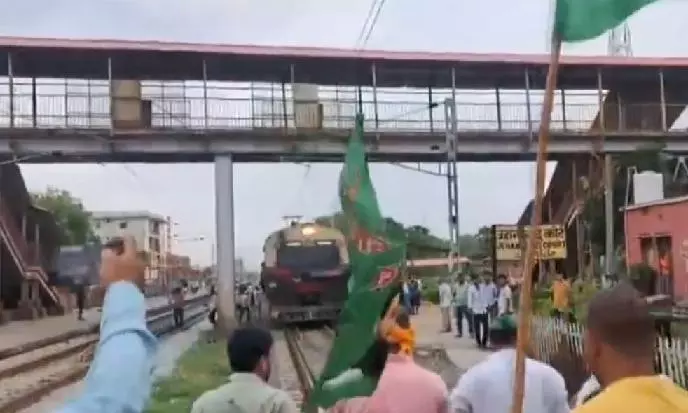
Bharat Bandh today: 6 things to know as 10 trade unions go on strike
Trade unions protest against new labour codes, contractualisation, and privatisation of PSUs; demand increasing minimum wages to Rs 26,000 per month, and MSP for farmers

At least 25 crore workers affiliated with 10 central sectoral trade unions have called a nationwide strike on Wednesday (July 9) to protest against new labour codes and privatisation, and press for demands such as a minimum wage of Rs 26,000 and a rollback to the old pension scheme.
Wednesday morning saw heavy police deployment across several cities with massive protests witnessed in West Bengal and Bihar.
Who has called the strike?
The strike has been called by 10 prominent trade unions - INTUC, AITUC, CITU, HMS, SEWA, AIUTUC, AICCTU, LPF, UTUC, and TUCC.
Why are trade unions protesting?
The trade unions are protesting against the new labour codes which they say will weaken rights of workers, extend working hours and make unions toothless.
Also read: Bharat Bandh on July 9 may disrupt banks, transport, and postal services
Apart from demanding to do away with the four labour codes, the labour unions are protesting against the contractualisation, and privatisation of PSUs.
They are also pressing to increase minimum wages to Rs 26,000 per month, as well as the demands of farmer organisations for Minimum Support Price (MSP) for crops based on Swaminathan Commission's formula of C2 plus 50 per cent and loan waiver.
What does 17-point charter of demand says?
The forum of 10 trade unions has given a 17-point charter of demand. It includes withdrawal of fixed-term employment and scrapping of Agnipath scheme, eight-hour workday, restoration of non-contributory Old Pension Scheme and a minimum monthly pension of Rs 9,000 for the EPFO subscribers, among others.
The forum has alleged that the economic policies are resulting into more unemployment, rising prices of essential commodities, depression in wages, cut in social sector spending in education, health, basic civic amenities, and all these are leading to more inequalities and miseries for poor, people of lower income group as well as the middle class.
Also read: 25 crore workers all set to join Bharat Bandh on July 9
“The four labour codes that have been passed by the Parliament are meant to suppress and cripple the trade union movement, increase working hours, snatch workers' right to collective bargaining, right to strike, and decriminalise violation of labour laws by employers,” the forum has stated.
The forum has also demanded implementation of the recommendation of Indian Labour Conference to give worker status to scheme workers-Anganwadi, Asha and Midday meal, Asha Kiran etc. and ESIC coverage to them.
The charter also suggests that here is an urgent need to form a Climate Resilience Fund to cover the risks and damages caused due to extreme climate conditions including heat wave, floods, cyclones, unseasonal rains and so on.
Besides, the unions have demanded for immediate halt to the privatisation of Indian Railways, road transport, coal mines and other non-coal mines, Port and Dock, Defence, Electricity, Postal, Telecom, Banks and Insurance sector etc.
Who is participating in the bandh?
Sectoral organisations such as the Samyukt Kisan Morcha (SKM) and NREGA Sangharsh Morcha have extended their support to the nationwide strike.
RSS-aligned Bharatiya Mazdoor Sangh (BMS), however, will not participate in the general strike, and has called it a “politically-motivated” protest.
In Bengal, supporters of the strike, which began at 6 am, tried to block train movement at Diamond Harbour in the Sealdah South section and Shyamnagar in the North Section of Eastern Railways' Sealdah division.
They also tried to block roads in different parts of the state, including Jalpaiguri, Asansol and Bankura.
The police and administration in the state made elaborate security and transport arrangements to ensure normal life.
Police contingents were posted at important places to ensure the smooth movement of traffic.
In Bihar, members of the RJD's students' wing blocked the train tracks at Jehanabad railway station in support of the strike.
Watch | Farmers disappointed with Budget 2025, call it ‘hopeless’
What will be affected?
The general strike is expected to disrupt services in sectors like banking, insurance, postal, coal mining, highway and construction, a trade union official told PTI on Tuesday.
However, banks are expected to remain open as July 9 is a working day.
Schools, colleges and government offices too are expected to remain open.
Also read: Andhra Pradesh increases maximum working hours from nine to 10
22nd general strike
This is the 22nd General Strike since the advent of neo-liberal policies in India in 1991, as per the unions. The general strike was initially called for May 20 but was rescheduled following the Pahalgam terror strike and subsequent Operation Sindoor.

